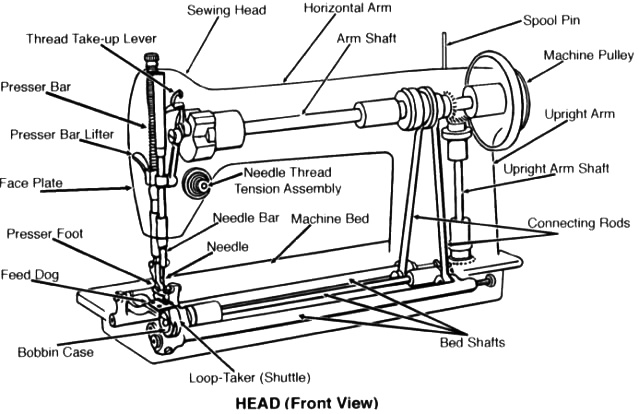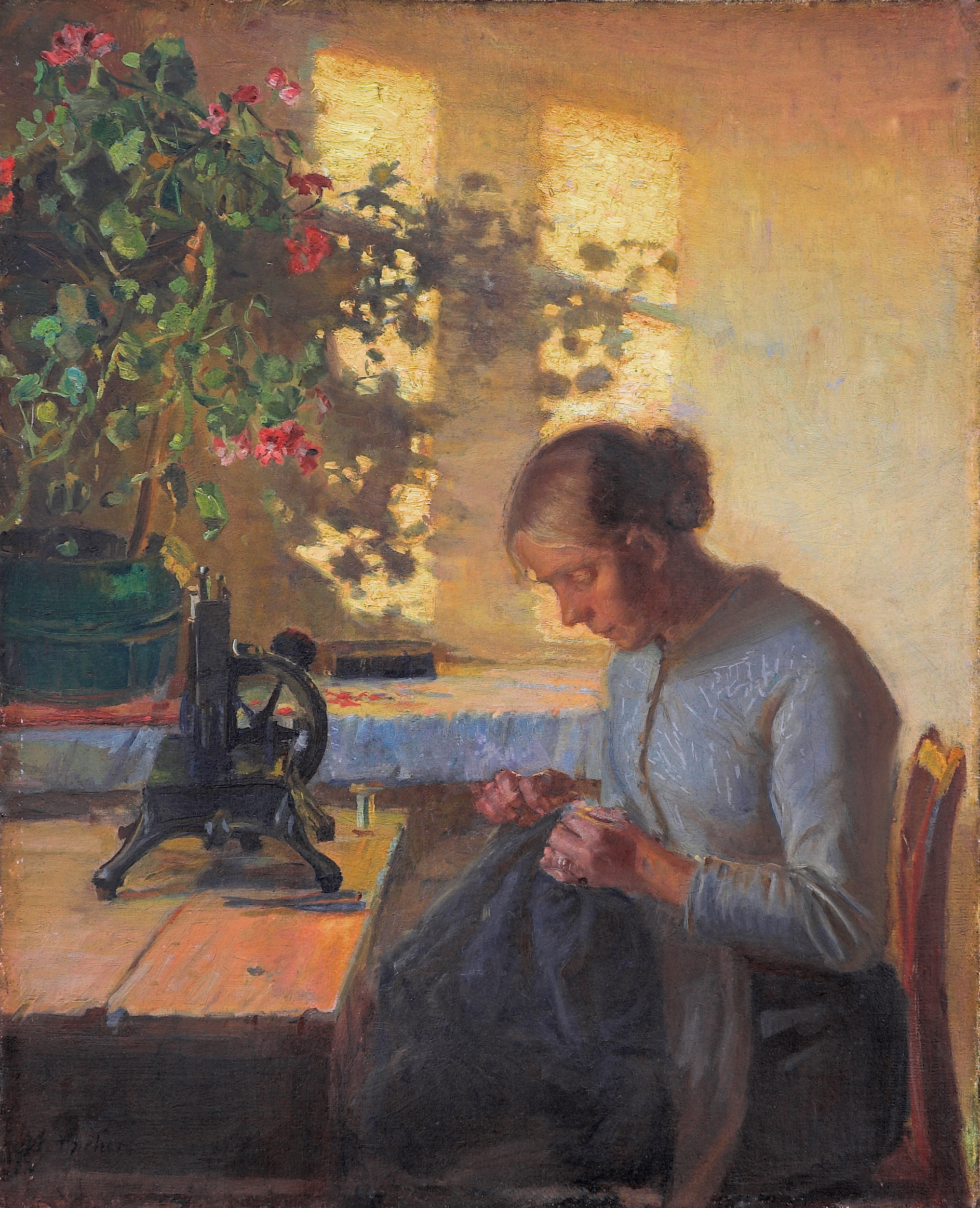|
Charles Fredrick Wiesenthal
Charles Fredrick Wiesenthal (1726–1789) was a German physician and inventor who was awarded the patent for the first known mechanical device for sewing in 1755. One might argue that he invented the sewing machine. He was born in the state of Brandenburg, Germany, but was in England at the time of invention, and lived from 1755 to 1789 in Baltimore. For his invention of a double pointed needle with an eye at one end, he received the British Patent No. 701 (1755), but after in 1830 Barthélemy Thimonnier reinvented the sewing machine. References 1726 births 1789 deaths 18th-century German inventors Sewing equipment Physicians from Brandenburg German philanthropists German surgeons German emigrants to the United States {{Germany-engineer-stub ... [...More Info...] [...Related Items...] OR: [Wikipedia] [Google] [Baidu] |
Sewing Machine
A sewing machine is a machine used to sew fabric and materials together with thread. Sewing machines were invented during the first Industrial Revolution to decrease the amount of manual sewing work performed in clothing companies. Since the invention of the first sewing machine, generally considered to have been the work of Englishman Thomas Saint in 1790, the sewing machine has greatly improved the efficiency and productivity of the clothing industry. Home sewing machines are designed for one person to sew individual items while using a single stitch type at a time. In a modern sewing machine, the process of stitching has been automated so that the fabric easily glides in and out of the machine without the inconvenience of needles, thimbles and other tools used in hand sewing. Early sewing machines were powered by either constantly turning a handle or with a foot-operated treadle mechanism. Electrically-powered machines were later introduced. Industrial sewing machines, by co ... [...More Info...] [...Related Items...] OR: [Wikipedia] [Google] [Baidu] |
Brandenburg
Brandenburg (; nds, Brannenborg; dsb, Bramborska ) is a states of Germany, state in the northeast of Germany bordering the states of Mecklenburg-Vorpommern, Lower Saxony, Saxony-Anhalt, and Saxony, as well as the country of Poland. With an area of 29,480 square kilometres (11,382 square miles) and a population of 2.5 million residents, it is the List of German states by area, fifth-largest German state by area and the List of German states by population, tenth-most populous. Potsdam is the state capital and largest city, and other major towns are Cottbus, Brandenburg an der Havel and Frankfurt (Oder). Brandenburg surrounds the national capital and city-state of Berlin, and together they form the Berlin/Brandenburg Metropolitan Region, the third-largest Metropolitan regions in Germany, metropolitan area in Germany with a total population of about 6.2 million. There was Fusion of Berlin and Brandenburg#1996 fusion attempt, an unsuccessful attempt to unify both states in 1996 and ... [...More Info...] [...Related Items...] OR: [Wikipedia] [Google] [Baidu] |
Baltimore
Baltimore ( , locally: or ) is the most populous city in the U.S. state of Maryland, fourth most populous city in the Mid-Atlantic, and the 30th most populous city in the United States with a population of 585,708 in 2020. Baltimore was designated an independent city by the Constitution of Maryland in 1851, and today is the most populous independent city in the United States. As of 2021, the population of the Baltimore metropolitan area was estimated to be 2,838,327, making it the 20th largest metropolitan area in the country. Baltimore is located about north northeast of Washington, D.C., making it a principal city in the Washington–Baltimore combined statistical area (CSA), the third-largest CSA in the nation, with a 2021 estimated population of 9,946,526. Prior to European colonization, the Baltimore region was used as hunting grounds by the Susquehannock Native Americans, who were primarily settled further northwest than where the city was later built. Colonist ... [...More Info...] [...Related Items...] OR: [Wikipedia] [Google] [Baidu] |
Barthélemy Thimonnier
Barthélemy Thimonnier (19 August 1793 in L'Arbresle, Rhône - 5 July 1857 in Amplepuis) was a French inventor, who is attributed with the invention of the first sewing machine that replicated sewing by hand. He was born in L'Arbresle, in Rhône in France. Early life In 1795, his family moved to Amplepuis. Thimonnier was the eldest of seven children. He studied for a while in Lyon, before going to work as a tailor in Panissières. Barthelemy Thimonnier married an embroideress in January 1822. In 1823, he settled in a suburb of Saint-Étienne and worked as a tailor there. Invention of the sewing machine Though the first sewing machine needle was patented by Charles Fredrick Wiesenthal in 1755, in 1829 Thimonnier reinvented the sewing machine. In 1830 he signed a contract with Auguste Ferrand, a mining engineer, who made the requisite drawings and submitted a patent application. The patent for his machine was issued on 17 July 1830 in the names of both men, supported by the Fre ... [...More Info...] [...Related Items...] OR: [Wikipedia] [Google] [Baidu] |
1726 Births
Seventeen or 17 may refer to: *17 (number), the natural number following 16 and preceding 18 * one of the years 17 BC, AD 17, 1917, 2017 Literature Magazines * ''Seventeen'' (American magazine), an American magazine * ''Seventeen'' (Japanese magazine), a Japanese magazine Novels * ''Seventeen'' (Tarkington novel), a 1916 novel by Booth Tarkington *''Seventeen'' (''Sebuntiin''), a 1961 novel by Kenzaburō Ōe * ''Seventeen'' (Serafin novel), a 2004 novel by Shan Serafin Stage and screen Film * ''Seventeen'' (1916 film), an American silent comedy film *''Number Seventeen'', a 1932 film directed by Alfred Hitchcock * ''Seventeen'' (1940 film), an American comedy film *''Eric Soya's '17''' (Danish: ''Sytten''), a 1965 Danish comedy film * ''Seventeen'' (1985 film), a documentary film * ''17 Again'' (film), a 2009 film whose working title was ''17'' * ''Seventeen'' (2019 film), a Spanish drama film Television * ''Seventeen'' (TV drama), a 1994 UK dramatic short starring Christ ... [...More Info...] [...Related Items...] OR: [Wikipedia] [Google] [Baidu] |
1789 Deaths
Events January–March * January – Emmanuel Joseph Sieyès publishes the pamphlet '' What Is the Third Estate?'' ('), influential on the French Revolution. * January 7 – The 1788-89 United States presidential election and House of Representatives elections are held. * January 9 – Treaty of Fort Harmar: The terms of the Treaty of Fort Stanwix (1784) and the Treaty of Fort McIntosh, between the United States Government and certain native American tribes, are reaffirmed, with some minor changes. * January 21 – The first American novel, '' The Power of Sympathy or the Triumph of Nature Founded in Truth'', is printed in Boston, Massachusetts. The anonymous author is William Hill Brown. * January 23 – Georgetown University is founded in Georgetown, Maryland (today part of Washington, D.C.), as the first Roman Catholic college in the United States. * January 29 – In Vietnam, Emperor Quang Trung crushes the Chinese Qing forces in N ... [...More Info...] [...Related Items...] OR: [Wikipedia] [Google] [Baidu] |
18th-century German Inventors
The 18th century lasted from January 1, 1701 ( MDCCI) to December 31, 1800 ( MDCCC). During the 18th century, elements of Enlightenment thinking culminated in the American, French, and Haitian Revolutions. During the century, slave trading and human trafficking expanded across the shores of the Atlantic, while declining in Russia, China, and Korea. Revolutions began to challenge the legitimacy of monarchical and aristocratic power structures, including the structures and beliefs that supported slavery. The Industrial Revolution began during mid-century, leading to radical changes in human society and the environment. Western historians have occasionally defined the 18th century otherwise for the purposes of their work. For example, the "short" 18th century may be defined as 1715–1789, denoting the period of time between the death of Louis XIV of France and the start of the French Revolution, with an emphasis on directly interconnected events. To historians who expand ... [...More Info...] [...Related Items...] OR: [Wikipedia] [Google] [Baidu] |
Sewing Equipment
Sewing is the craft of fastening or attaching objects using stitches made with a sewing needle and thread. Sewing is one of the oldest of the textile arts, arising in the Paleolithic era. Before the invention of spinning yarn or weaving fabric, archaeologists believe Stone Age people across Europe and Asia sewed fur and leather clothing using bone, antler or ivory sewing-needles and "thread" made of various animal body parts including sinew, catgut, and veins. For thousands of years, all sewing was done by hand. The invention of the sewing machine in the 19th century and the rise of computerization in the 20th century led to mass production and export of sewn objects, but hand sewing is still practiced around the world. Fine hand sewing is a characteristic of high-quality tailoring, haute couture fashion, and custom dressmaking, and is pursued by both textile artists and hobbyists as a means of creative expression. The first known use of the word "sewing" was in the 14th cen ... [...More Info...] [...Related Items...] OR: [Wikipedia] [Google] [Baidu] |
Physicians From Brandenburg
A physician (American English), medical practitioner (English in the Commonwealth of Nations, Commonwealth English), medical doctor, or simply doctor, is a health professional who practices medicine, which is concerned with promoting, maintaining or restoring health through the Medical education, study, Medical diagnosis, diagnosis, prognosis and therapy, treatment of disease, injury, and other physical and mental impairments. Physicians may focus their practice on certain disease categories, types of patients, and methods of treatment—known as Specialty (medicine), specialities—or they may assume responsibility for the provision of continuing and comprehensive medical care to individuals, families, and communities—known as general practitioner, general practice. Medical practice properly requires both a detailed knowledge of the Discipline (academia), academic disciplines, such as anatomy and physiology, pathophysiology, underlying diseases and their treatment—the ... [...More Info...] [...Related Items...] OR: [Wikipedia] [Google] [Baidu] |
German Philanthropists
German(s) may refer to: * Germany (of or related to) **Germania (historical use) * Germans, citizens of Germany, people of German ancestry, or native speakers of the German language ** For citizens of Germany, see also German nationality law **Germanic peoples (Roman times) * German language **any of the Germanic languages * German cuisine, traditional foods of Germany People * German (given name) * German (surname) * Germán, a Spanish name Places * German (parish), Isle of Man * German, Albania, or Gërmej * German, Bulgaria * German, Iran * German, North Macedonia * German, New York, U.S. * Agios Germanos, Greece Other uses * German (mythology), a South Slavic mythological being * Germans (band), a Canadian rock band * "German" (song), a 2019 song by No Money Enterprise * ''The German'', a 2008 short film * "The Germans", an episode of ''Fawlty Towers'' * ''The German'', a nickname for Congolese rebel André Kisase Ngandu See also * Germanic (other) * Germa ... [...More Info...] [...Related Items...] OR: [Wikipedia] [Google] [Baidu] |
German Surgeons
German(s) may refer to: * Germany (of or related to) **Germania (historical use) * Germans, citizens of Germany, people of German ancestry, or native speakers of the German language ** For citizens of Germany, see also German nationality law **Germanic peoples (Roman times) * German language **any of the Germanic languages * German cuisine, traditional foods of Germany People * German (given name) * German (surname) * Germán, a Spanish name Places * German (parish), Isle of Man * German, Albania, or Gërmej * German, Bulgaria * German, Iran * German, North Macedonia * German, New York, U.S. * Agios Germanos, Greece Other uses * German (mythology), a South Slavic mythological being * Germans (band), a Canadian rock band * "German" (song), a 2019 song by No Money Enterprise * ''The German'', a 2008 short film * "The Germans", an episode of ''Fawlty Towers'' * ''The German'', a nickname for Congolese rebel André Kisase Ngandu See also * Germanic (other) * Germ ... [...More Info...] [...Related Items...] OR: [Wikipedia] [Google] [Baidu] |




